HR Tech Festival Asia 2024: Be future-ready and embrace change

The 23rd edition of HR Tech Festival Asia 2024 commenced with great enthusiasm at the Marina Bay Sands Expo and Convention Centre in Singapore. Themed Engage. Grow. Transform. Designing the Future: How HR Can Be Architects of Change, the two-day event, organised by HRM Asia, offered a deep dive into the evolving HR landscape amid technological innovation and demographic shifts.
Day 1 of HR Tech Festival Asia 2024 kicked off with welcome remarks from Gnosoulla Tsioupra-Lewis, Chief People and Culture Officer, Arc Network and parent organisation of HRM Asia. “HR is now focused on a human-centric approach that empowers employees and fuels business growth,” shared Tsioupra-Lewis. “At the forefront of this movement stands HR Tech Festival Asia 2024, the premium event for HR professionals in Asia-Pacific which curates amazing events to bring the HR community, global influencers, and industry experts together to learn, collaborate, inspire, and discuss the most relevant workplace issues faced by organisations in Asia today.”
A highlight of this year’s HR Tech Festival Asia was the Guest of Honour Address by H.E. Dr Kao Kim Hourn, Secretary General of ASEAN, the Association of South-East Asian Nations. Dr Kao, who addressed the crowd via streaming, welcomed guests and attendees to the event, congratulating HRM Asia for once again organising HR Tech Festival Asia, and acting as a platform for HR professionals in the region to share knowledge and discuss human development, especially in a region that hosts 10 countries and a working demographic of 230 million.
Dr Kao highlighted the importance of discussing this, as statistics revealed that 11.2% of the population reached the age of 60, and the responsibility of caring for an ageing population would thus fall on the younger employees within the region. He described the young working population as the backbone of ASEAN’s economy, identifying three trends that would affect HR practices within South-East Asia for years to come: the growing shift to digital transformation; a rising demographic shift favouring younger employees; and exploring sustainable, green processes within working organisations.
Dr Kao’s speech was further accentuated by remarks from Keith Sonderling, Commissioner, US Equal Employment Opportunity Commission (EEOC), who shared his views from the perspective of a federal agency that regulates HR. Sonderling shared how as HR professionals it could be difficult to focus on a singular issue, as much of HR issues are regularly affected by global issues. However, he also identified growing shifts that organisations are currently facing in the US, including sexual harassment, mental health and wellness, and disability issues, which are compounded by the growing and changing needs of a younger, more well-educated workforce.
He acknowledged the importance of digital transformation in HR, addressing the fear of using AI amongst employees, and how there is now more need to streamline processes in HR teams to help make things easier across organisations, as well as its potential to evolve and develop processes despite fears of possible bias and discrimination that can be programmed into AI. “I don’t believe that HR vendors want to create products that are built to discriminate, and I don’t believe any organisation would want to buy a product that would do so.” There is, Sonderling highlighted, a need to carefully design programmes that are properly used.
Sonderling’s remarks were followed by a leadership panel that discussed what the future holds for leaders in HR. Panellists Aslam Sardar, CEO, Institute for Human Resource Professionals (IHRP); Aileen Tan, Group Chief People and Sustainability Officer, Singtel; and Akarin Phureesitr, Chief People Officer, Central Pattana; along with moderator Parul Munshi, Workforce Transformation Partner and Regional Sustainability Consulting Leader, PwC South-East Asia Consulting, took time to discuss a broad range of topics that would affect HR leaders and thus the way they would approach leadership and shaping the policies of their organisations.
Much discussion was dedicated towards topics such as the experimentation of AI and tech by forward-thinking leaders, which combats the anxiety and fear some employees have regarding AI. Tan, for example, cited her fascination with generative AI tools such as ChatGPT, which, as she said, “has made me realise that I am not obsolete at all”. Another topic at hand includes the importance of making conscious, purposeful dedication towards objectives that do not clutter up the key performance indicators of any organisation so that there is a clear, direct path towards a goal.
Taking the stage next was Melinda McKinley, Global Head of HR Strategy and Digital Transformation at Standard Chartered Bank, who shared insights into navigating the evolving HR landscape. She highlighted the need to align HR and employee experience for better business outcomes, showcasing Standard Chartered Bank’s high-performing culture with practices like goal setting, performance feedback, leadership feedback, and a recognition and reward framework.
McKinley also delved into the bank’s unique “experience approach” to HR transformation. This five-step process emphasises understanding employee needs and potential impacts before implementation. The approach starts with discovering foundation design, where potential solutions are explored through employee interviews and focus groups. Next comes defining global and local design, which refines the solution based on global principles while considering local needs. Develop testing follows, allowing for a thorough review of the entire employee experience with the proposed solution. Deliver cutover and launch provides guidance on effectively implementing the solution, and finally, driving continual insights ensures ongoing feedback and adjustments for successful adoption.
McKinley’s presentation was followed by a panel discussion moderated by Lim May-Ann, Director of Data Governance at Access Partnership and Executive Director at Asia Cloud Computing Association, which delved into strategies to ensure organisational agility and resilience amidst rapid technological advancements. Panellists Dean Tong, Managing Director and Head of Group HR at UOB; Melissa Kee, Chief People Officer of Temus; Terence Chia, Assistant Chief Executive (Corporate), Cluster Director (Human Capital Cluster), Infomm Media Development Authority (IMDA); and Tan Toi Chia, Chief of People, Organisation and Communications at StarHub, offered a wealth of actionable insights.
During the discussion, Tan highlighted the importance of embracing AI as another avenue to improve collaboration and achieve better performance, emphasising the potential of AI as a complement to existing capabilities. Tong echoed this sentiment, emphasising the need to strike a balance between embracing technology and leveraging the human element. Tong emphasised that while technology offers deep integration possibilities, the human element remains essential in complementing and maximising the potential of technology.
In another presentation, Eileen Nah, Managing Director and Head of Future Smart and Leadership at OCBC Bank, provided insights into the evolving role of AI in shaping the future of work. With a focus on prioritising skills development for talent mobility and career advancement in an era of constant change, Nah emphasised the critical need for organisations to maintain agility in their approach to talent management. She underscored the importance of fostering workforce agility to adapt to pivotal shifts in reskilling, upskilling, and lifelong learning necessitated by the ever-evolving workplace landscape.
Moreover, Nah highlighted the transformative power of AI and digital inclusivity in driving progress towards achieving both business and people-centric growth. During her presentation, she posed a thought-provoking question, “How do you harness the power of generative AI in your work?” She shared insights into OCBC’s approach to leveraging technology collaboratively and developing a curriculum with internal experts to embrace and grow alongside emerging technologies.
Nah emphasised the concept of digital inclusivity, urging organisations to proactively leverage technology to enhance their capabilities rather than allowing it to overpower them. This approach, she suggested, fosters a culture of continuous learning and growth, ensuring organisations remain at the forefront of innovation and adaptation in the digital age.
Emerging as a pivotal discussion topic, the theme of navigating a volatile, uncertain, complex, and ambiguous (VUCA) world took centre stage at HR Tech Festival Asia 2024. Led by Diana Wu David, Work Futurist and CEO of Future Proof Lab, the session surmised that with the rise in challenges within technology, globalisation, and shifting demographics, there is a need to recognise that the world is constantly changing, and leaders need to develop muscles to prepare for the future.
“We have to figure out how we’re going to be ahead of the curve,” Diana said. She cited a study in 2023 where, in a review of many organisations, HR was embracing strategic foresight in three areas: identifying skills needs, cultivating growth mindsets, and building future robust structures that allow leaders to thrive and drive employees. This can only be done with the help of understanding what is coming, creating strategic scenarios where leaders identify growth areas and mitigate risks, and aligning culture and incentives to help people see around corners within organisations.
Another keynote session presented by Steve Boese, President and Co-Founder of H3 HR Advisors, was a pivotal exploration of the intersection between technology, economics, and societal dynamics, and their profound influence on organisational landscapes. He said, “The challenge is in a fast-moving world with changing conditions, technological advancements, and dynamic operating environments, HR must equip the organisation and the people of the organisation for sustainable success.”
Boese dissected the intricate relationship between emerging technologies and HR strategies, shedding light on how these factors can drive meaningful business transformation. He also highlighted the importance of agility in establishing organisations to be ready for change, establish priorities, and identify needed employee capabilities in navigating the complexities of today’s business environment.
How can organisations look into navigating change management? Justin Angsuwat, Chief People Officer of Culture Amp; and Anita Low-Lim, Chief Transformation Officer, TOUCH Community Services, both took on the challenge to discuss this, where they shared what was driving culture within organisations that focused solely on change. “As HR professionals, we often think that people leave managers, not organisations,” shared Angsuwat. “But when we looked at the data, what we discovered was that if you had a great manager but a bad leader, you are more likely to leave an organisation than if you had a bad manager but a great leader. Leaders play a very important role in how an organisation functions.”
Low-Lim added that managers have a difficult task, as they are not just managers, but leaders are expected to do well in the portfolio set before them. “One of the things that we will ask our managers is how they are maximising or organising the resources given to them,” she said.
They went on to discuss the importance of leveraging data alongside real-world examples to illustrate the impact of cultural shifts on talent retention, and how TOUCH Community Services’ work with Culture Amp has helped to raise employee engagement and develop managers and their performance, boosting the confidence of managers and helping employees define what they are experiencing within the organisation.
Continuing the discussion, Chelsea Lee, Global Head of People, Parcel Perform; and Adrit Raha, Managing Director, CoverGo; shared the issues of organising and managing a distributed workforce across different types of workforce, including those with hybrid work arrangements, and those working fully remote, especially across global regions. With moderator Karen Ng, Regional Director, Asia, Deel, the panellists explored the people practices and structures that have succeeded within organisations that have to deal with distributed workforces.
Lee pointed out three aspects that have helped build rapport between teams and employees: open transparency and communication, team engagement, and employee appreciation recognition. Raha concurred with Lee, adding that there is a need to keep an eye on the promotion rate within organisations, as it helps develop employee engagement, retention, and recruitment, especially with the opening of job roles across a bigger pool of talent.
In the realm of talent management, David Jones, CEO and Partner at Mercer Talent Enterprise, underscored the vital role of data-driven talent analytics in effective talent management. Jones urged attendees to critically evaluate their current strategies and assess their impact on business goals, emphasising the power of talent assessment to drive improvements and shape desired business outcomes.
He highlighted the significance of talent identification and succession planning, stressing their crucial role in ensuring business continuity and managing organisational risk. Jones also emphasised that talent is distributed across the entire organisation, and critical roles, which tend to encompass less than 10-15% of unique roles within the workforce, can be found across various levels and functions.
Building upon this foundation, another session, led by Craig Smith, Product Lead for Business Agility at SoftEd; and Shannon Ewan, CEO of the International Consortium for Agile (ICAgile), focused on fostering a growth mindset within organisations. This session highlighted the importance of developing agility – the ability to adapt and deliver high value – to achieve organisational goals and meet evolving customer needs.
“Agility is a sustainable business approach that seeks to delight customers while making work joyful,” Smith explained. “Agile is a mindset, a culture, a way of thinking and responding to change in organisations. Agile requires a cultural shift. It requires collaborative teams, trust, honesty, courage, openness, and the adoption of a genuinely safe-to-fail environment.”
Day 1 of HR Tech Festival Asia came to a close with Rebecca Sham, Managing Director, People, Quality, Technology and Innovation, AMEA, FedEx, who gave the closing keynote speech. Sham discussed how organisations can look to simplify HR processes and transform them from within, using FedEx as an example.
She cited the importance of “less is more”, which included reducing the number of request channels so that there would be simplified channels of communication. She also cited the importance of training and upskilling employees within the organisation, encouraging learning agility.
The result saw internal promotions within FedEx who took the lessons they learned to share new ideas and innovation within the organisation. Sham reiterated the importance of leveraging technology and upskilling to adapt, which would not just benefit the organisation but also the employees who will take it with them along their career journeys for the rest of their lives.
“Don’t resist technology. Leverage on it. Make use of it and be a better person and create a better workplace for your workmates and yourself by utilising technology,” she concluded.



